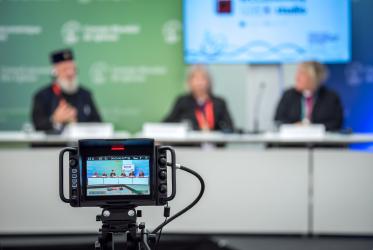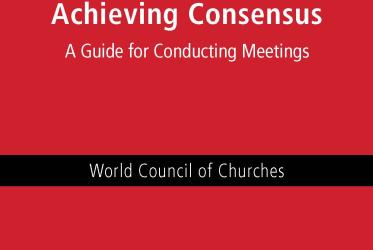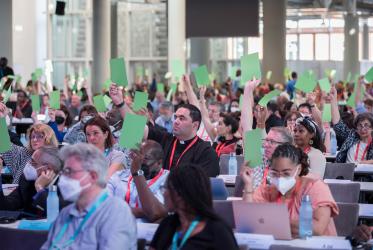1. Introduction
The Programme Committee continued its work following its first report to the Central Committee. The committee worked intensively with good spirit and under the wise moderation of Father K. M. George and other members selected by him. Overall, the committee believed that it had more work than it could do adequately and reflects these convictions in the section on its self evaluation. However, it is pleased to report to the Central Committee at this time.
2. Moderator and General Secretary Reports
The Programme Committee reviewed the reports of the Moderator and the General Secretary. After expressing the appreciation for the reports, the PC made suggestions relating to programmatic work from the reports and forwarded those comments to Policy Reference Committee III.
3. Permanent Committee on Consensus and Collaboration
- Gen 4.1, Revised Rule XVI
- Gen 4.2, A New Rule III.6: The Permanent Committee on Consensus and Collaboration
- Gen 4.3, Constitution and Rules of the WCC
The committee supported the aims of the proposals to establish the committees. However, it raised a number of procedural and process issues that it forwarded to the Policy Reference III Committee for their consideration.
4. Finance Committee Visit
The Finance Committee made a presentation to the Programme Committee regarding the 2005 budget and the framework budget for 2006. They indicated that the budget for 2005 can stand as developed. Regarding 2006, even though they anticipate reduced income, the staffing can remain as at present if considerable savings can occur in the programme cost lines. They suggested changed patterns for programmes and activities following the assembly can lead toward the needed savings. The Programme Committee sought to work with this information as it formulated its response to the Pre-Assembly Programme Evaluation as should be evident in later sections of this report.
5. ACT-Global
Elizabeth Ferris, WCC staff, introduced the Programme Committee to the possibility of a new, emerging instrument provisionally called ACT Global. This initiative seeks to strengthen the effectiveness of churches and ecumenical organizations to respond to growing human needs and builds on 7-8 years of discussions. The WCC recently convened a meeting at the request of some agencies with people from a variety of ecumenical backgrounds to seek ways of increasing collaboration in order to strengthen the effectiveness of relief, development and advocacy work. A proposal to establish the instrument, as well as the appointment of a steering group, convened by the WCC, emerged from the meeting.
The PC welcomes the increased collaboration, while affirming that the mission of the church is integral, and that theological reflection and practical actions must be held together. While recognizing the need to respond quickly and effectively to urgent situations, the Programme Committee also affirms the need to continue to create broad consensus. In this regard it would be helpful to include more representatives of the churches in the steering group.
While the implications for WCC may be considerable the PC recognizes that new opportunities also appear and that careful reflection needs to take place.
The Programme Committee recommends that:
the Commissions of the Churches for Diakonia and Development (CCDD), JPIC, and CCIA, at their June 2005 meeting, reflect on the programmatic implications and possibilities for WCC's work of the initiative to establish a new ecumenical instrument, provisionally called ACT Global. The Commissions are asked to report on these programmatic implications and possibilities to the September 2005 Executive Committee.
6. The Pacific Plenary
The Programme Committee reflected on the plenary presentation on the Pacific. It welcomed the presentation and the call from the Pacific churches to engage further on the issue of climate change. The Programme Committee reminds Central Committee that work on climate change is an activity of Justice, Peace and Creation that seeks to address issues of climate change on the global level.
7. Review of From Harare to Porto Alegre
The Programme Committee continued a process reported to the Central Committee in its first Programme Committee Report on 16 February. Comments were noted during the Central Committee plenary discussion and were also collected from the various committees of the Central Committee, and from individuals. These comments were reviewed by the Programme Committee, amended and supplemented, and forwarded to the compiler.
Many comments reinforced the need for the report to present candidly the successes of the Council's work since Harare as well as to describe forthrightly the challenges the WCC faced as well as to what it was unable to accomplish. The committee has already recommended to the Central Committee the need for the introduction to the report to describe the context of the Committee's work. The fast changing ecumenical and ecclesial context, as well as a struggle to live within limitations of financial resources, were but two of the challenges facing the Council. Comment was also made that the report should be used to identify what had been learned within the ecumenical movement since Harare.
The Programme Committee recommends that:
A section be added to the report that seeks to identify what significant ecumenical learning's have emerged during the period under review, and
The officers review and approve the final copy of the report in July 2005 prior to its publication.
8. Pre-Assembly Programme Evaluation
The Programme Committee received the presentation from the Pre-Assembly Evaluation Team concerning their report, Doc. GEN 8. A similar presentation was shared with the Central Committee Plenary discussion and table group discussions were invited to submit questions and comments to the Programme Committee to take into consideration in considering the report. The report was also referred to all the committees of Central Committee and the Programme Committee was pleased to receive responses from these together with a presentation from the General Secretary synthesizing the response of the staff. The Programme Committee on behalf of the Central Committee expresses its gratitude to the Evaluation Team for their hard work and fulfillment of their mandate.
From the information that the PC had before it, it was clear that the pre-assembly evaluation report rang true'. This was in the sense of the constituency not understanding or owning much of the programme work. There was a general agreement that the WCC needs to do less, do it in a more focused way, and do it well. There was gratitude expressed for the hard work done by all programme staff and a concern for them in a time of change.
While broadly welcoming the report, responses to the section on recommendations showed considerable disquiet and lack of clarity. Common concerns from more than one source were:
- Anxiety about whether a further restructuring really addressed the need.
- Confusion over the diagram 3.3 in relation to the wording of the recommendations.
- Issues around prioritization by WCC fellowship in tension with reality of funding partners not adequately addressed here.
- Concern that the WCC was about both deepening and broadening the fellowship, though recognizing that these can be in tension with one another.
- Recognition that this report did not (and had not been asked to) evaluate governing bodies and a recognition that these have had weaknesses.
- Concerns around Planning, Monitoring and Evaluation: wondering what happened to criteria set previously; wondering whether this encourages introspection; and whether it makes the WCC too much an organization and not enough a fellowship.
- Concerns that it was not clear how the Commissions of historic streams of the WCC work, with their semi-autonomous constitutions, fitted into the scheme.
Nonetheless there were some things from the recommendations that were generally being affirmed:
- The need for time specific indications re. programmes and activities, and for this to be part of the planning.
- The need to have planned exit strategies, that is, planned phasing out or relocation of programmatic work.
- The need for clear aims/goals for programmes and activities.
- The affirmation of particular methodologies for ownership by the churches, namely living letters, the building of networks, lessons from DOV processes.
In the light of the above, the Programme Committee has revised the recommendations found in the back of GEN 8 and now brings its recommendations to the Central Committee.
8.1 Purpose and Vision
The primary purpose of the WCC is expressed in the constitution as: Para III Purposes and Functions
"The primary purpose of the fellowship of churches in the World Council of Churches is to call one another to visible unity in one faith and in one eucharistic fellowship, expressed in worship and common life in Christ, through witness and service to the world, and to advance towards that unity in order that the world may believe."
The Programme Committee believes that the CUV (Common Understanding and Vision Document), adopted by the Harare Assembly in 1998, amplifies the constitutional vision for the WCC as a fellowship of churches. Recognizing that the pre-assembly evaluation report highlights that this document is not well known in the member church constituency
the Programme Committee recommends that:
Central Committee reaffirm the CUV document as an expression of the vision of the WCC as a fellowship of churches;
ways be found to make the document more easily accessible so as to facilitate greater ownership of this vision.
The Programme Committee draws attention again to Paragraph III of the Constitution beyond stating the primary purpose, it says,
In seeking koinonia in faith and life, witness and service, the churches through the Council will:
-- promote the prayerful search for forgiveness and reconciliation in a spirit of mutual accountability, the development of deeper relationships through theological dialogue and the sharing of human, spiritual and material resources with one another;
-- facilitate common witness in each place and in all places, and support each other in their work for mission and evangelism;
-- express their commitment to diakonia in serving human need, breaking down barriers between people, promoting one human family in justice and peace, and upholding the integrity of creation, so that all may experience the fullness of life;
-- nurture the growth of an ecumenical consciousness through processes of education and a vision of life in community rooted in each particular cultural context;
-- assist each other in their relationships to and with people of other faith communities;-- foster renewal and growth in unity, worship, mission and service.
These purposes and functions demonstrate the breadth of the vision of the WCC and provide a foundation for the programmatic work of the Council.
8.2. Unique Role of the WCC
At the same time that this breadth of vision exists, the pre-assembly programme evaluation has clearly heard the call for the WCC to do less, yet with sharper focus, and to do it well. A key question is what can the WCC do, uniquely, as a global fellowship of churches?
The Programme Committee recommends that a Fourfold Strategic Focus be adopted as the means by which the Council can develop greater clarity and coherence in its unique role as a global fellowship of churches.
Fourfold Strategic Focus:
o FIRST, deepening the fellowship through developing clear theological foundations, enabling study and reflection from a variety of perspectives to be brought into dialogue and relationship together.
o SECOND, enhance the role of the churches in speaking out together and enabling others to speak out in ways that may become seen as prophetic, or in advocacy with those whose voices are not always easily heard.
o THIRD, by listening to, reflecting with, accompanying and challenging:? the member and associate member church constituency - nurturing relationships;
- the wider constituency - as represented by the mapping exercise of the reconfiguration process;
- the wider world- as an international body with links to global organisations and, at the other end of the spectrum, with grass roots movements, both secular and related to other faith communities.
o FOURTH, by facilitating a stewardship of ecumenical resources- seeing collaboratively the human, financial and physical resources as an integral part of any accountable, programme work.
Whilst any particular programme or activity of the WCC may most clearly relate to one of the above, the Programme Committee believes that it is important that every programme relate in some way to all four of these. Additionally, the Fourfold Strategic Focus provides an internal coherence for the total programming through any one of these four approaches. It provides a mind-set within which the detailed planning, monitoring and evaluating of programme work is to be carried out.
8.3 Assembly Responsibilities
The Programme Committee gave consideration to the mandate for the Assembly Programme Guidelines Committee (APGC). It noted that it is the task of the Assembly to determine the overall policies of the World Council and to review programmes undertaken to implement policies previously adopted.' [Constitution V. 1.c) 4)]
The APGC is mandated to establish policies for all further programme work of the WCC. In doing so, the APGC may give examples of programmes which would follow the policy. However, it is not the task of the APGC to propose programmes.
The PC believes that the document From Harare to Porto Alegre" will provide a basis for the APGC to review the programmatic work for the recent years. The Programme Committee recognizes that the reports on programming through the past seven year do not provide accessible categories to look at the programmatic life of the WCC. However, the framework of thirteen programmes plus two ecumenical initiatives is the most recent framework and was adopted in 2002 in light of financial limitations. They will provide the most immediate access to the APGC for understanding the present programmatic standpoint of the WCC.
The Programme Committee recommends that the APGC:
1. Review the programmatic work of the WCC using the report From Harare to Porto Alegre;
2. Receive the Pre-Assembly Evaluation Report, Parts 1 and 2, and an amended Part 3;
3. Determine overall policies for future programme work;
4. Look broadly at possible priorities for future work;
5. Propose ways of working with its report in the period prior to the September 2006 Central Committee meeting.
For the sake of continuity of the programmatic life of the Council and an understanding of respective roles, and of the Fourfold Strategic Focus, the Programme Committee also recommends that at least three members of the current Programme Committee be appointed by the Executive Committee on the APGC.
8.4 Anticipating Programmatic Design and Staffing in 2006 and in the Post-Assembly Period.
The period between the Assembly and the 2006 Central Committee meeting will be a necessary time for the staff to focus upon developing and providing programmatic design proposals for the 2006 Central Committee. The Programme Committee has been limited in its work by the lack of concrete recommendations on programmatic prioritization during its meetings since Harare. The PC appreciated the Staff Leadership Group's reluctance to give guidance. However, such recommendations would have allowed the Programme Committee to carry out their mandate which they could not do with the time and resources available to them.
The Programme Committee recommends that:
the work of the staff during that period from the Assembly until the September Central Committee meeting be in the light of the following:
o Policies established by the Assembly;
o A review and carrying out of the process to close programmes from the period before Porto Alegre that should not be continued as a result of Assembly actions and new directions;
o Implementation of a networks methodology utilized in the DOV process and called four by the Fourfold Strategic Focus;
o Plans clearly in line with the financial resource forecasts provided by the WCC Income Coordination and Development office and the Finance Committee;
o The building of a clear, well-functioning Planning, Monitoring and Evaluation mechanism that is principally a tool for joint learning, self-analysis, reflection and improvement;
o Consideration of the possible need and the wisdom of conducting external evaluation of programming not recently evaluated and that is continuing.
The Programme Committee also recommends that:
the Staff Leadership Group act upon the WCC Pre-Assembly Evaluation Management Report and report to the Executive Committee concerning its implementation.
It seems clear that when these areas of work are followed, there will be fewer activities directed by the WCC, and smaller activities costs for the year 2006.
8.5 Additional Recommendations
Many of the recommendations from the end of Part III, The Overall Assessment of Programmes and Recommendations, have been recast in the recommendations of this section listed above. Recommendations 3.2.1 (calling for all programmes to be phased out, reaffirmed or reshaped in 2006 and 2007) and 3.2.3 have yielded to different processes and action. Recommendation 3.2.2 is recast in the "Purpose and Vision" section above. Recommendation 3.2.4 regarding core functions has been replaced by the Fourfold Strategic Focus. Recommendation 3.2.8 has been incorporated into the staffing recommendations above. The Programme Committee recommends the adoption of the other recommendations: 3.2.5, 3.2.6, 3.27, and 3.29.
The Programme Committee recommends that:
the Programming, Monitoring and Evaluation tool built and used by staff:
- Clearly define issues that are a) long term nature, b) time-bound and specific/urgent;
- Make documented choices about priorities based on:
- core competence
- listening to and involving the constituency
- what is best done globally
- funding realities;
- Build in a clear exit strategyplan the phasing out/reconfiguring/reshaping in all programme designs;
- Ensure that there is a communication strategy developed relative to each programme and carried out in the various constituencies.
9. Programme Committee Self-Evaluation
The PC engaged in a self-evaluation exercise led by the Pre-Assembly Self-Evaluation Team. This included individuals answering a questionnaire. Nineteen questionnaires were returned for analysis.
Responses indicated the following:
- Strengths: The spirituality of moderator, the sharing of moderation, commitments of those who have been present, tenacious working through difficult issues.
- Weaknesses: The amount of material to be addressed in a short period of time, the inability to deal with our mandate due to financial constraints, and irregular attendance during the meetings.
In answer to the question asking people to describe their experience of Programme Committee, the dominant positive words were that it had been a challenging, learning experience, enabling cooperation and fellowship to develop. The dominant negative words were that it had been confusing, frustrating with poor organization and lack of clarity of expectations...
The Programme Committee reflected on its six-fold mandate found in the Rules, namely:
1. Discharging its Responsibility of Making Recommendations to CC on matters regarding programmes and activities of the WCC.
2. Ensuring that the development of programmes take into account major thrusts and policies adopted by the CC.
3. Recommending to the CC about initiation and termination of programme activities.
4. Providing and making Recommendations on Regular Evaluation of Programmes.
5. Recommending to the CC the Mandate and Size of the Commissions and Boards.
6. Appointing Other Advisory Groups for Specific Areas or Constituencies as Deemed Appropriate.
The Committee believed that it has been most successful in fulfilling the first of these and least successful in fulfilling numbers three and five. However, the majority of the Programme Committee did not rate its fulfillment of any of these stated goals very highly.
In the light of this, to improve its future functioning, the Programme Committee recommends that:
the future Programme Committee, after the Assembly:
- be reduced in size to 15 Central Committee members, at least two of whom must be on the Executive Committee, plus the moderators of consultative bodies;
- that some meetings be held separately from Central Committee but a logic of relating to the Roundtable discussions with funding partners and the Executive Committee;
- that an extensive orientation process be part of the first meeting;
- that the Executive Committee seek continuity from the Assembly Programme Guidelines Committee to the new Programme that, in the forming of this committee, sensitivity be given to all usual balances of representation of the WCC, and
- that the Programme Committee, at its first meeting, appoint a core group to act as a steering group during its meetings, to attend Roundtable discussions with funding partners, and to accompany staff on the implementation of programmatic decisions between meetings.



